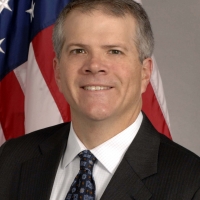Jun212016
Posted at 11:44 AM
U.S. Deputy Secretary of Commerce Bruce Andrews delivered remarks at the 7th U.S.-China Aviation Summit on June 20, in Washington, D.C. The Deputy Secretary highlighted the importance of the aviation sector to the U.S.-China commercial relationship.
Remarks as Prepared for Delivery
It is a pleasure to be here for the 7th U.S.-China Aviation Summit. I would like to thank the U.S. Trade and Development Agency and AAAE for extending me the invitation.
I also want to thank our Chinese colleagues for traveling all the way here.
The Department of Commerce leads the Obama Administration’s efforts to strengthen the U.S.-China commercial relationship.
The dialogue made possible by this summit and the Aviation Cooperation Program have been an important part of our commercial engagement for more than a decade.
For three years now, U.S. companies have exported more aerospace products to China than anywhere else.
According to our Top Markets Reports, U.S. exports of aircraft and aircraft parts to China totaled $15.9 billion in 2015 alone.
By 2033, China is predicted to be the world’s largest domestic aviation market.
At the Department of Commerce, our mission is to help America’s aerospace industry take part in that growth.
Of course, new opportunities bring new challenges.
For China’s aviation sector to continue its rapid growth, we need the right infrastructure in place.
Already, global demand for infrastructure is at an all-time high.
Too often though, we talk about infrastructure only in terms of bridges and roads.
In an increasingly globalized world, the aviation industry plays an equally important role connecting our nations, businesses, and cultures.
To our Chinese colleagues here tonight, you should be proud of your aviation sector’s growth over these past 30 years.
The growth of your industry has helped connect China to the global market.
Yet we all face new challenges. We both must address increasing congestion at our airports.
I believe these are challenges that we can overcome – in part – through cooperation and the sharing of best practices.
When our two countries work together, we can bring about real change that benefits our countries, our economies, and our people.
For this sector, that starts with acknowledging the complexity of the challenges we face.
Improving infrastructure and paving the way for smoother air travel is just as much about good governance, good procedures, and good communication as it is about construction and technology.
I saw this firsthand last year when I spoke in Dalian at the Aviation Technology Summit.
That’s why earlier this month we were so pleased to announce a new phase in our bilateral aviation relationship at this year’s Strategic and Economic Dialogue (S&ED).
At the S&ED the United States and China agreed that a strategic, whole-of-government approach was necessary to make aviation systems more efficient.
Just yesterday we held a working level meeting to solidify our government cooperation going forward.
The Department of Commerce is actively working to strengthen our commercial ties and increase U.S. aerospace exports to China.
We’ll be showcasing American innovation at the airshow in Zhuhai in November, and will have commercial officers on hand to provide market intelligence, match making and other resources.
We’ve also held several aerospace technology roadshows, bringing U.S. companies to cities throughout China to meet with airport planners and explore new opportunities.
And every day, our specialists at the International Trade Administration experts, like Alexis Haakensen on our aerospace team, help businesses connect directly with potential Chinese business partners.
For U.S. companies here this evening, I encourage you to reach out to our Aerospace Team in Washington.
For Chinese companies, I urge you to work with our embassy. Lola Gulomova and Yasue Pai are two outstanding assets for this sector – you should work with them whenever possible.
The United States is committed to increased economic cooperation with China. That is one of the many reasons that President Obama and President Xi decided to make 2016 the U.S.-China Tourism Year. I was honored to attend the launch event for the Tourism Year just a few months ago.
Our two presidents announced the Tourism Year not only to foster greater exchanges between our people, but also to strengthen commercial partnerships between our two countries.
As we all know well, the success of our bilateral relationship is critical to global economic growth and stability – and aviation is a great enabler of that relationship.
So let’s continue working together -- through summits like this one and other forums -- to ensure aviation remains a centerpiece of our partnership.
Thank for you for the opportunity to be here this evening.

